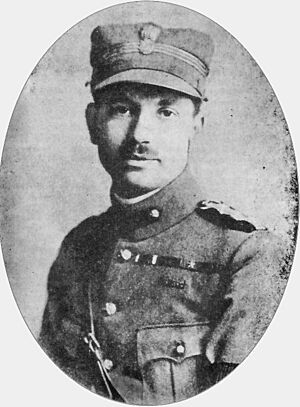Dimitrios Psarros facts for kids
Quick facts for kids
Major General
Dimitrios Psarros
|
|
|---|---|

Dimitrios Psarros in uniform.
|
|
| Native name |
Δημήτριος Ψαρρός
|
| Born | c. 1893 Chryso, Phocis, Kingdom of Greece |
| Died | 17 April 1944 Kingdom of Greece |
| Allegiance |
|
| Service/ |
|
| Rank | |
| Battles/wars | Balkan Wars
Greco-Turkish War (1919-1922) |
| Alma mater | Hellenic Military Academy |
| Spouse(s) | Niki Psarrou |
Dimitrios Psarros (Greek: Δημήτριος Ψαρρός; 1893 – April 17, 1944) was a brave Greek army officer. He was a key leader during the Greek Resistance movement in World War II.
Psarros founded and led a resistance group called National and Social Liberation (EKKA). This group was one of the three most important organizations fighting against the Axis powers in Greece. Sadly, he was killed by Greek communist forces in 1944.
Early Life and Military Career
Psarros was born in 1893 in a village called Chryso, in the area of Phocis. He studied at the Hellenic Military Academy, which is a school for army officers. In 1916, he finished his training and became a Second Lieutenant in the artillery.
Psarros first fought in the Balkan Wars as a volunteer, even before he finished military school. In 1916, he joined a government called the National Defence government. He fought in World War I on the Macedonian front. He also took part in the Allied intervention in the Russian Civil War as a Captain, where he was injured.
He showed great courage in the Greco-Turkish War (1919-1922). Thanks to his bravery, his soldiers were able to return to Greece from Asia Minor safely. Before this war, he went to France for more advanced military studies. After returning, he worked for the Army of Evros, which was very important for Greece's plans at the time. He also taught at the new Greek War Academy. Later, he helped create the Ministry of Aviation and worked as a Chief of Staff for an army division.
Challenges and Resistance
In March 1935, Psarros was involved in a failed attempt to change the government. Because of this, he was removed from the army. This event helped the royalist (supporters of the king) army leaders bring back the Greek monarchy later that year.
When World War II started, Psarros wanted to rejoin the army. However, the government at the time, led by Ioannis Metaxas, refused.
After Germany invaded Greece in April 1941, the country was taken over by Germany, Italy, and Bulgaria. Psarros tried to start a resistance group in Amfissa, but it didn't work out. Then he went to Macedonia.
In July 1941, he helped start an organization called Freedom (Eleftheria) with some communist members. This group fought against the Bulgarians in northern Greece. The Bulgarians had taken over parts of Greece and wanted to keep them forever. Unfortunately, Psarros was betrayed and had to escape from the Axis forces.
He went to Athens. In April 1942, he founded EKKA. He started it with other important people like the politician Georgios Kartalis and other army officers. EKKA's goals were to fight the Axis powers (Germany, Italy, Bulgaria) during the occupation. After Greece was free, they wanted to work for social changes, like a social democratic system. EKKA was also against communism and supported social liberalism.
EKKA soon formed its own fighting group, named after the famous 5/42 Evzone Regiment. They mostly fought in Central Greece, near Mount Gkiona. Their forces were smaller, with about 1,000 fighters at their peak. Other groups like ELAS had 50,000 fighters, and EDES had about 14,000.
His Death
On April 17, 1944, which was Easter Monday, Psarros's 5/42 Regiment was attacked. The attackers were forces from the ELAS. ELAS was controlled by the Communist Party of Greece. They wanted to be the only powerful group in Greece after the war. They also wanted to disarm EKKA and become even stronger.
Psarros's regiment was broken up by ELAS. Psarros himself was killed while he was held captive. According to witnesses, a colonel named Efthimios Zoulas was his killer. His body was left unburied for several days before it was finally buried in the local cemetery.
The killing of Colonel Psarros was a very sad moment in the Greek Resistance. People from all resistance groups were shocked when they heard about his death. In 1945, the Hellenic Army honored him by promoting him to the rank of Major General after his death.
Images for kids
 | Percy Lavon Julian |
 | Katherine Johnson |
 | George Washington Carver |
 | Annie Easley |


